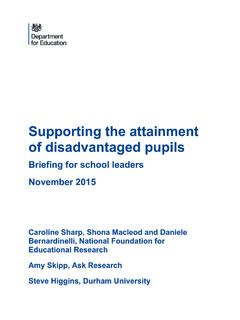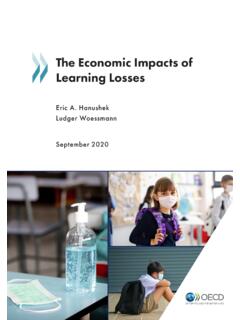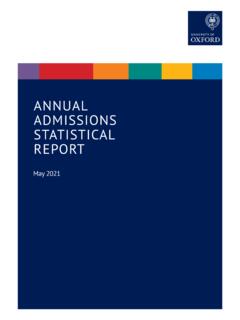Transcription of CONSTRUCTIVIST APPROACH TO TEACHER EDUCATION: AN ...
1 CONSTRUCTIVIST APPROACH TO TEACHER EDUCATION: AN INTEGRATIVE MODEL FOR REFLECTIVE TEACHINGA ssociate Professor of Education, St. Ann's Cllege of Education(Autonomous), Mangalore University, theory of constructivism states that learning is non-linear, recursive, continuous, complex and relational Despite the difficulty of deducing CONSTRUCTIVIST pedagogy from CONSTRUCTIVIST theories, there are models and common elements to consider in planning new program. Reflective activities are a common feature of all the programs of CONSTRUCTIVIST TEACHER Education .It is used at both Pre-service and In-service level of TEACHER Education. Several studies have proved that, critical reflection upon experience continues to be an effective technique for professional development. The paper discussing the nature of CONSTRUCTIVIST APPROACH to TEACHER education emphasizes the role of reflective activities in TEACHER training.
2 Based on the results of the research reviews in the field of CONSTRUCTIVIST TEACHER education and reflective teaching, the findings of the study strongly suggests the integration of reflective teaching practice in the pre-service TEACHER education curriculum and suggests a proposed integrative model for reflective teaching. The study investigated the effects of different methods of teaching science on the achievement, basic science process and skills and scientific attitude of standard six pupils with different achievement levels. The study revealed that methods have differential effects on different contexts, that is, different pre-achievement levels. These differences were due to differences in the process variables. The study suggests that to implement any method, the context needs to be considered for its effectiveness and hence student-teachers need to be trained in analyzing their teaching in terms of context variables to establish relationship between presage-context-process-product so that the student TEACHER can improve his/her teaching as a student and develop transformation learning as a professional.
3 In this study effectiveness of these three methods on achievement, scientific attitude and basic science process skills were found out by establishing fidelity of each method. This could be done effectively through reflective teaching training. Hence the findings imply that student teachers need to be trained in reflective teaching so that they will be familiar with the different approaches of reflective teaching and tools and techniques used for observing and analyzing classroom interaction and improve upon their teaching : Constructivism, Reflective Teaching, CONSTRUCTIVIST TEACHER Education, Reflective Teaching Training Model(RTTM),Integrative Model for Reflective Teaching(IMRT) VIJAYA KUMARI new millennium has been characterized by an unprecedented break-through in knowledge and technology.
4 21st century challenges have called for new paradigms and maps of engagements in spheres of life. Education in particular, continues to play a pivotal role in ensuring national and global survival and Delores Report (UNESCO, 1996) sets out an agenda for the future which implies that of significant changes are needed in pre-service TEACHER education programs to select and prepare a new generation of teachers equipped with the knowledge, skills and values to help their culturally different and their socially disadvantaged students to learn, to reduce conflicts peacefully, to respect each other's dignity and cultures and to become socially responsible citizens [18].A considerable body of research has shown that pre-service TEACHER education has a significant impact on early career of TEACHER 's teaching skills and their philosophies of teaching [4],[8].
5 In particular, CONSTRUCTIVIST TEACHER s education has been shown to have a positive impact on student TEACHER 's perceptions of their own RESEARCH PAPERS31li-manager s Journal o Psychology, Vol. No. 4 ln Educational 7 February - April 2014 teaching competencies leading to increased confidence and also improved teaching practice within schools [2],[4],[6].ConstructivismConstructivism is an APPROACH in which the learner is building an internal illustration of knowledge, and a personal interpretation of experience. It is active, constructive, goal-directed, diagnostic and reflective [15].In CONSTRUCTIVIST theory, it is assumed that learners have to construct their own knowledge individually and collectively. Each learner has a repertoire of conceptions and skills in which she or he must construct knowledge to solve problems presented by the environment.
6 The role of the TEACHER and other learner is to provide the setting, pose the challenges, and offer the support that will encourage cognitive construction [3]. Since students lack the experience of experts in the field, teachers bear a great responsibility for guiding student's activity, modeling behavior, and providing examples that will transform student group discussions into meaningful communication about subject matter [5].Brooks and Brooks (2005) provide a set of descriptors of CONSTRUCTIVIST 's teaching behaviours, which they feel teachers can use to experiment with the APPROACH .[1] The set of descriptors describe teachers to construct their own understandings of content, not simply as providers of information and managers of behavior .Following are the CONSTRUCTIVIST teaching behaviors identified.
7 Encouraging and accepting student autonomy and initiative. Use raw data and primary sources, along with manipulations and interactive and physical materials. Uses cognitive terminology while framing tasks. Allow students responses to drive lessons, shift instructional strategies and alter content. Enquire about students understanding of the concepts. Encourage students to engage in dialogue, both with the TEACHER and with one another. Encourage students enquiry by thoughtful open ended questions and encouraging students to ask questions to each other. Seek elaboration of students initial response. Engage students in experiences that might engender contradictions to their initial hypotheses and then encourage discussion. Allow wait time after posing questions. Provide time for students to construct relationships and create metaphors.
8 Nurture students' natural curiosity through frequent use of learning cycle TEACHER EducationTeacher Educators around the world are exploring the promises and practices of CONSTRUCTIVIST theories for preparing learners. Wood (1995) suggested that The alternative perspective that constructivism offers by defining learning as a process of personal construction of meaning offers a potentially powerful way to rethink TEACHER education [17]. The work of Rainer (2002) supported this idea and suggested that there are dimensions of CONSTRUCTIVIST theories that provide a way of reframing TEACHER education.[12] Richardson (1997) suggested there were two different forms of CONSTRUCTIVIST TEACHER Education [13]as follows, Teaching teachers to teach according to a CONSTRUCTIVIST APPROACH and Working with TEACHER -Learner in a CONSTRUCTIVIST way to help them understand their tacit and introduce new conceptions as possible beliefs and alternatives to those held by the and Guyton (2004) reviewed 22 pre-service programs, 11 in-service / graduate programs and seven in service / professional development programs for a total of 40 CONSTRUCTIVIST 's effort.
9 [11] The analysis of these studies made an effort to teach according to the principles of CONSTRUCTIVIST theories. They synthesized the key features appearing in both the pre-service and in-service programs to identify the CONSTRUCTIVIST pedagogy for TEACHER education. The categories of features identified RESEARCH PAPERS32li-manager s Journal o Psychology, Vol. No. 4 ln Educational 7 February - April 2014 represent a variety of beliefs and practices that when taken together suggest the following elements of CONSTRUCTIVIST It is evident from a majority of the programmatic efforts and is seen by many CONSTRUCTIVIST TEACHER educators as a sort of adhesive that connects and cements the various components or tasks within a TEACHER education program. Reflection also is viewed as a necessary catalyst in the active process of reconciling new and potentially dissonant experiences with the prior beliefs and understanding of the learner.
10 Programs include opportunities for reflection about the various readings, discussions, and experiences. Writing in dialogue journals, discourse with other TEACHER learners, and video-taping coupled with reflection provide other sources of examining practice. Learner Centred InstructionsMany CONSTRUCTIVIST TEACHER education programs promote Learner-Centred Instruction because of their understanding that learning is minimized by educational settings that take student interests and ownership into account, sharing intellectual control with LearningConstructivist pedagogy also emphasizes collaborative learning as collaborative learning groups provide contexts and processes for developing positive social skills such as being able to rationally justify an idea or solution to one's peers and to listen critically yet respectfully to the opinions and perspectives of others.
















